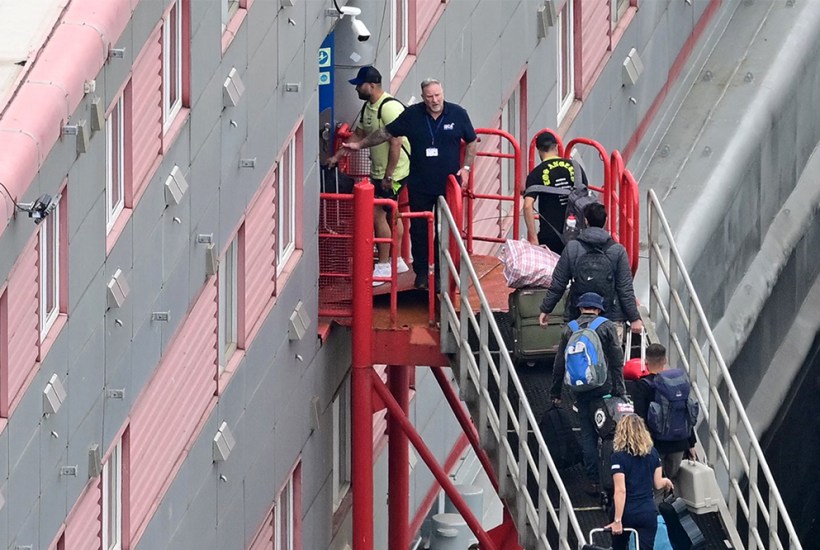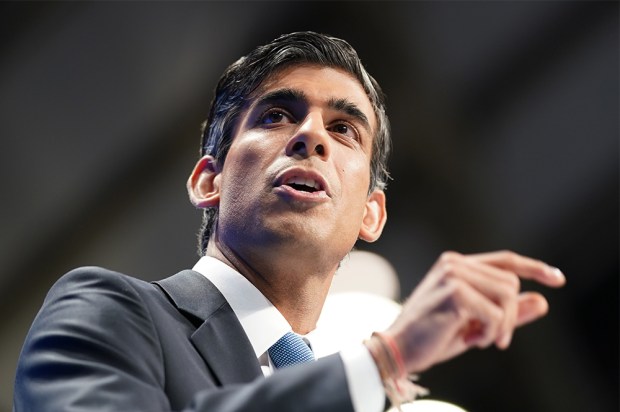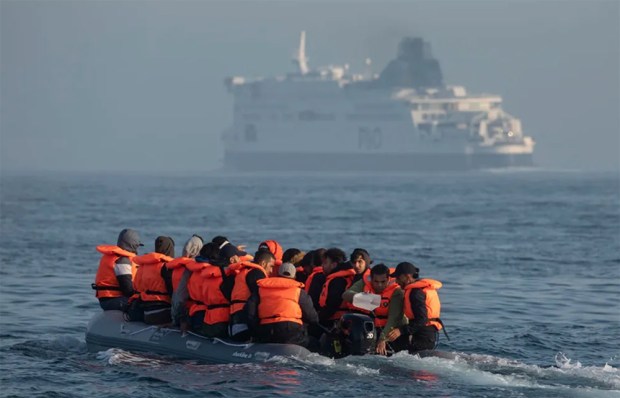Over decades of service as a floating hotel, the Bibby Stockholm has accommodated all manner of people. It has housed workers for a Swedish wind farm and for the new Shetland gas plant; homeless people in Hamburg, asylum seekers in Rotterdam. It was briefly considered as a ‘high-end’ barge for students: with 222 en-suite rooms, a restaurant, TV room and gym, it was touted to Irish universities as a floating hall of residence. It makes sense, then, that the government considers the vessel a suitable place to house asylum seekers – given that Britain has so few large residential spaces available.
But the mooring of the Bibby Stockholm in Portland harbour has triggered yet another round of hysterical outrage. Ministers have been accused of ‘gratuitous cruelty’ and taking ‘pleasure from the misery of others’. Lawyers acting for 25 of the asylum seekers have so far prevented them from being put on board the vessel. The plan is that most refugees will share rooms in this basic accommodation – but that is hardly a human rights abuse.
This furore gives Rishi Sunak an opportunity to make the case for a sensible and moral settlement on the issue of refugees. At the last count, 170,000 asylum seekers were waiting for their cases to be heard, of whom almost 130,000 have been waiting more than six months. Some have been waiting for well over a year. This delay is indefensible. Failing to deal swiftly with new arrivals (instead forcing them to live in hotels at taxpayers’ expense) is unfair to the taxpayer and the claimant alike – a waste of money and of life. Meanwhile, word spreads that anyone who arrives in the UK, legally or not, stands little realistic chance of being deported.
If Sunak wishes to lift the burden of paying for accommodation, he could allow asylum seekers to work to support themselves – on the understanding that the situation changes if their appeal fails. Robert Buckland, the former justice secretary, has called on ministers to consider that idea: there is something odd, he argues, in a Tory government demanding that young, energetic people stay on benefits rather than take jobs.
In theory, forcing arrivals to spend their time in hotels doing nothing but waiting for their day in court should be a deterrent. In practice, it has not deterred in the slightest. Asylum applications have more than trebled over the past ten years and the policy of forced hotel stays has put a huge burden on the public purse. The situation is out of control. Just three years ago, 60,000 asylum seekers were being kept at an average cost of £20 a night: that was expensive enough. Now it’s closer to 120,000 people being kept at an average £100 a night (though not all are housed in hotels). This tots up to a completely unsustainable cost of £6 million a night in hotels alone, which is being met by raiding the foreign aid budget. Those who protest against the use of the Bibby Stockholm ought to be asked: what is their solution?
The real problem is the human trafficking industry, which has grown dramatically by exploiting the weakness of the UK system and the desperation of people who scrape together thousands of pounds for the passage. Deporting illegal immigrants is the only way of stopping that cruelty, as it destroys the business model. Sunak should pledge to expand legal routes of entry and offer to take in two genuine asylum seekers who apply through legal means for every person who arrives illegally and is deported. Above all, that would separate genuine asylum seekers from economic migrants.
In a way, the English Channel crossings are a sideshow. The vast majority of the world’s refugees do not venture far from home; in the case of Syria, most are in neighbouring countries. If the money spent on accommodating arrivals to Britain were used to aid those who are displaced abroad, how many more would be helped? The goal, surely, should be for Britain to discharge its duty as a rich country by doing what it can for the greatest number of people – not just those who can afford to pay people smugglers.
Waiting for asylum seekers and economic migrants to arrive on our beaches and then having to tell one from the other is not a humane policy. To help the greatest number of refugees, we need to get aid as close to the problem area as possible, establishing camps from which people can swiftly return home when it becomes safe for them to do so. The 1951 UN Refugee Convention, which focuses on those who complete crossings, is long out of date. Sunak should argue for a new global agreement to be made, pointing out that the current mess plays into the hands of people traffickers.
Yet almost all the debate on asylum and refugees seems to have become dominated by migrants who arrive in Britain. That needs to change. A successful migration and asylum policy would be one that is generous to those coming to Britain to take up either skilled work, or unskilled work where there is a shortage of available labour; which responds rapidly to emergencies around the world; which pours in resources to help refugees as close to their homes as possible; and which is tough on illegal immigration.
At present, Britain has a reasonable policy for accepting skilled migrant workers. We are good, if not exceptional, at helping refugees around the world – but we are failing badly when it comes to tackling illegal immigration. Sunak does not have much time left to convince voters that he can get it right.
Got something to add? Join the discussion and comment below.
Get 10 issues for just $10
Subscribe to The Spectator Australia today for the next 10 magazine issues, plus full online access, for just $10.
You might disagree with half of it, but you’ll enjoy reading all of it. Try your first month for free, then just $2 a week for the remainder of your first year.














Comments
Don't miss out
Join the conversation with other Spectator Australia readers. Subscribe to leave a comment.
SUBSCRIBEAlready a subscriber? Log in